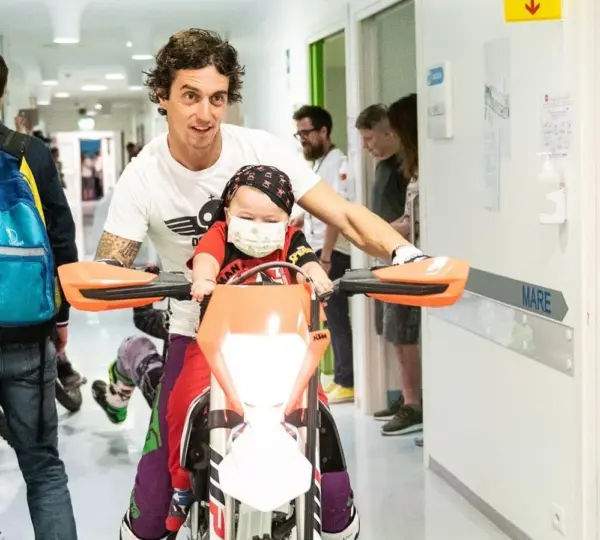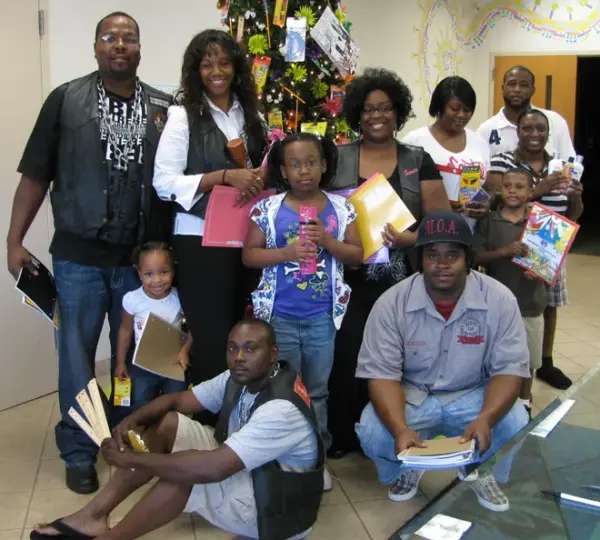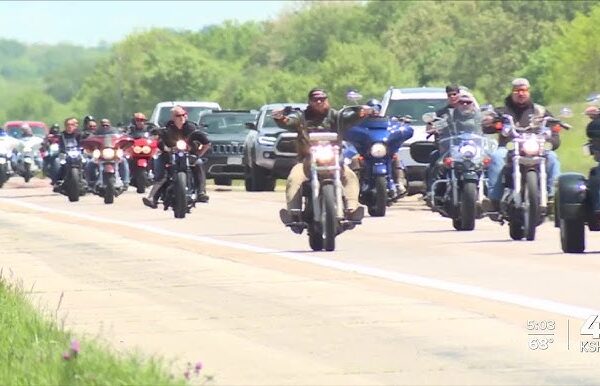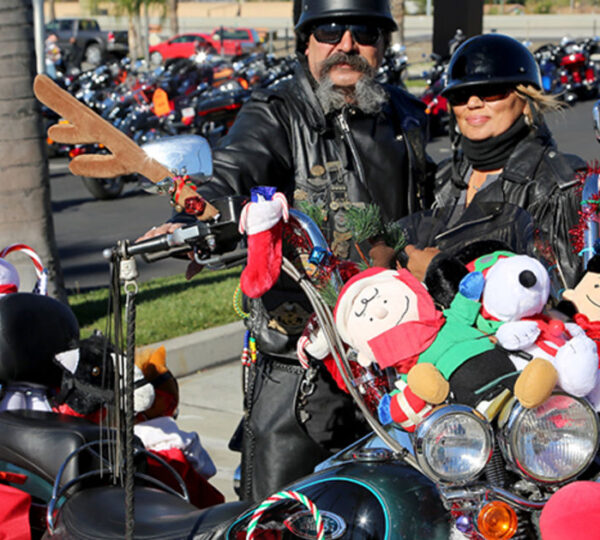I was just another aging rider passing through a hospital lobby that afternoon—another man with too many roads behind him, too many losses tucked into the lining of his jacket, and not much left in the world that could surprise me.
Forty years riding under open skies had carved patience into my bones and quiet into my heart.
I’d seen accidents on highways, strangers fighting in diners, families splitting apart, and men who had no idea how to rebuild themselves. Life had taught me not to react.
Not to flinch. Not to feel more than necessary. But the moment I stepped into that lobby, all of that vanished.
Something about the stillness of the moment, the tightness in the air, the way voices echoed off the polished floors—it all pushed me toward the scene unfolding by the reception desk.

A young mother stood there, trembling, her arms wrapped desperately around her little girl. The child looked so small I could have held her in one hand. Her head—bald from treatments—rested weakly against her mother’s neck.
Her tiny fingers clutched her mother’s shoulder as if she was afraid the world might drop her if she loosened her grip. Even from where I stood, I could see exhaustion carved into every line of that woman’s face.
Sleepless nights. Endless worry. Too many conversations with doctors she never wanted to meet.
She was trying—fighting—not to break.
Across from her stood a hospital administrator with a clipboard pressed to her chest.
Her face was unreadable, almost mechanical, like she had buried any trace of humanity beneath layers of protocol and routine. Her voice carried none of the emotion the moment deserved.
“I’m sorry, but your insurance has expired. You’ll need to vacate the room.”
The words landed with a thud.
Cold.
Flat.
Final.
The mother’s voice cracked as she spoke, her words coming out small and fragile:
“Please… we don’t have anywhere else to go.”
Her explanation tumbled out—how they had been living in their car for months, fighting to stay near the hospital, trying to stretch every coin in a world that demanded bills she couldn’t pay.

How her child needed treatment. How she was willing to sleep anywhere, do anything, as long as her little girl could stay safe.
But the administrator only repeated her script.
Rules were rules.
Insurance was insurance.
People without either didn’t get to stay.
And in that moment—watching a mother beg for mercy while holding a child who could barely lift her head—something inside me twisted painfully.
I had lived long enough to know suffering comes in many shapes.
But watching that woman, I saw a different kind of suffering—one no parent should ever face alone.
As I stood there, the faint scent of disinfectant in the air, the hum of machines somewhere down the corridor, I felt the past rushing up to meet me.
My daughter, Emily. Her laughter.
Her small hands. The moments I replayed in my mind on long rides when the road was quiet and memories grew loud.

The ache I thought I had buried rose back up like a wave.
Without thinking… I moved toward them.
A Call Made Out of Instinct — and Love
I didn’t have a plan.
I didn’t have a speech ready.
All I had was the instinct to pull out my phone and call the only family I had left—my brothers in leather, men who had patched me back together after my daughter passed, men who understood pain and loyalty better than any rulebook.
“I need you,” I told them.
“A little girl needs you.”
That was all I needed to say.
Bikers don’t ask for explanations.
They just show up.
Within an hour, the hospital that had seemed cold and indifferent moments earlier transformed into a place filled with heavy boots, leather jackets, and quiet strength.
Riders lined the hallway—not threatening, not angry, but solid and reassuring like a human barrier between the child and the world that had failed her.
One man handed Sarah a warm meal. Another offered blankets.
Another sat with her and listened—the kind of listening that heals, not the kind meant to hurry someone up.
A nurse whispered to me that she had never seen anything like it.
No shouting. No chaos. Just a group of strangers who refused to let a mother and child be pushed aside like unwanted paperwork.

For the first time in months, Sarah didn’t stand alone.
The Moments That Mattered Most
People love dramatic stories. They talk about the show of force, the riders filling the lobby, the administrator suddenly softening her tone. But what stayed with me were the softer moments—the ones quiet enough to be missed.
Little Aina—so tiny, so pale, so fragile—laughed when my brothers arranged stuffed animals all around her pillow. A real laugh. Thin, small, but real. A laugh that felt like a miracle rising up in a place that had become too familiar with sorrow.
Sarah, sitting beside her daughter’s bed, finally allowed her shoulders to relax. I watched hope flicker through her eyes, the kind of hope you only see in someone who has been drowning and suddenly feels the ground under their feet again.
And then there were the machines.
The steady beeping.
The soft whirs of monitors.
For once, the sounds didn’t feel threatening. They felt like guardians—steady, patient, keeping watch.
One evening, when my brothers had stepped out for coffee, little Aina looked up at me. Her eyes, though tired, were filled with a clarity I will never forget.
“When I go to heaven,” she whispered, “I’m going to find your Emily. I’ll tell her you miss her.”
My breath caught.
My vision blurred.
Forty years of road-hardened calm cracked right down the middle.
In that moment, grief and grace collided with such force that something inside me changed forever.
Two little girls—one gone, one slipping away—had become the bridge between the man I had been and the man I needed to become.
A Goodbye No Child Should Ever Face, Yet Faced With Honor
Aina slipped away quietly, wrapped in the arms of the mother who had fought for her with everything she had.
She passed not in fear, not in loneliness, but surrounded by warmth—by a family she had gained unexpectedly and by the brotherhood that had claimed her with pride.
We buried her with honor.
The sky was gray that morning, the kind of gray that feels heavy on your shoulders.
Chrome and leather stood in silent formation around her small white casket.
Engines rumbled in the background, low and gentle, like a lullaby for a warrior.
Some people whispered that it looked unusual, that biker jackets didn’t belong at a child’s funeral.
They didn’t understand.
Love comes in many forms.
And that day, love looked like men with scarred hands and patched vests, standing guard over the smallest angel we had ever known.
A Legacy of Quiet, Unbreakable Kindness
Sarah could have broken.
She could have disappeared into her grief.
But she didn’t.
Instead, she built something out of the ashes of her pain.
She became a social worker—one who fights for families the way she once had to fight for herself. She stands beside mothers who feel unheard, beside children who feel unseen, beside people slipping through cracks too wide for most to notice.
Whenever she speaks about that time, she always mentions the riders.
She says kindness saved her.
She says compassion carried her.
She says strangers became the reason she believed in humanity again.
Compassion doesn’t fade. It ripples.
And her work is the proof.
The Road Still Calls — But My Journey Has Changed
I still ride.
I still feel most like myself on a long stretch of highway with the horizon in my eyes and the engine humming beneath me.
But I am not the same man who walked into that hospital lobby.
I carry Aina’s laugh with me.
I carry Emily’s memory with me.
I carry the knowledge that sometimes the smallest act of compassion can redirect an entire life—maybe more than one.
The world didn’t shift that day.
But I did.
And so did Sarah.
And so did everyone who stood in that hallway.
Sometimes, changing just one moment is enough.
Sometimes… it’s everything.
I was just another aging rider passing through a hospital lobby that afternoon—another man with too many roads behind him, too many losses tucked into the lining of his jacket, and not much left in the world that could surprise me.
Forty years riding under open skies had carved patience into my bones and quiet into my heart.
I’d seen accidents on highways, strangers fighting in diners, families splitting apart, and men who had no idea how to rebuild themselves. Life had taught me not to react.
Not to flinch. Not to feel more than necessary. But the moment I stepped into that lobby, all of that vanished.
Something about the stillness of the moment, the tightness in the air, the way voices echoed off the polished floors—it all pushed me toward the scene unfolding by the reception desk.

A young mother stood there, trembling, her arms wrapped desperately around her little girl. The child looked so small I could have held her in one hand. Her head—bald from treatments—rested weakly against her mother’s neck.
Her tiny fingers clutched her mother’s shoulder as if she was afraid the world might drop her if she loosened her grip. Even from where I stood, I could see exhaustion carved into every line of that woman’s face.
Sleepless nights. Endless worry. Too many conversations with doctors she never wanted to meet.
She was trying—fighting—not to break.
Across from her stood a hospital administrator with a clipboard pressed to her chest.
Her face was unreadable, almost mechanical, like she had buried any trace of humanity beneath layers of protocol and routine. Her voice carried none of the emotion the moment deserved.
“I’m sorry, but your insurance has expired. You’ll need to vacate the room.”
The words landed with a thud.
Cold.
Flat.
Final.
The mother’s voice cracked as she spoke, her words coming out small and fragile:
“Please… we don’t have anywhere else to go.”
Her explanation tumbled out—how they had been living in their car for months, fighting to stay near the hospital, trying to stretch every coin in a world that demanded bills she couldn’t pay.

How her child needed treatment. How she was willing to sleep anywhere, do anything, as long as her little girl could stay safe.
But the administrator only repeated her script.
Rules were rules.
Insurance was insurance.
People without either didn’t get to stay.
And in that moment—watching a mother beg for mercy while holding a child who could barely lift her head—something inside me twisted painfully.
I had lived long enough to know suffering comes in many shapes.
But watching that woman, I saw a different kind of suffering—one no parent should ever face alone.
As I stood there, the faint scent of disinfectant in the air, the hum of machines somewhere down the corridor, I felt the past rushing up to meet me.
My daughter, Emily. Her laughter.
Her small hands. The moments I replayed in my mind on long rides when the road was quiet and memories grew loud.

The ache I thought I had buried rose back up like a wave.
Without thinking… I moved toward them.
A Call Made Out of Instinct — and Love
I didn’t have a plan.
I didn’t have a speech ready.
All I had was the instinct to pull out my phone and call the only family I had left—my brothers in leather, men who had patched me back together after my daughter passed, men who understood pain and loyalty better than any rulebook.
“I need you,” I told them.
“A little girl needs you.”
That was all I needed to say.
Bikers don’t ask for explanations.
They just show up.
Within an hour, the hospital that had seemed cold and indifferent moments earlier transformed into a place filled with heavy boots, leather jackets, and quiet strength.
Riders lined the hallway—not threatening, not angry, but solid and reassuring like a human barrier between the child and the world that had failed her.
One man handed Sarah a warm meal. Another offered blankets.
Another sat with her and listened—the kind of listening that heals, not the kind meant to hurry someone up.
A nurse whispered to me that she had never seen anything like it.
No shouting. No chaos. Just a group of strangers who refused to let a mother and child be pushed aside like unwanted paperwork.

For the first time in months, Sarah didn’t stand alone.
The Moments That Mattered Most
People love dramatic stories. They talk about the show of force, the riders filling the lobby, the administrator suddenly softening her tone. But what stayed with me were the softer moments—the ones quiet enough to be missed.
Little Aina—so tiny, so pale, so fragile—laughed when my brothers arranged stuffed animals all around her pillow. A real laugh. Thin, small, but real. A laugh that felt like a miracle rising up in a place that had become too familiar with sorrow.
Sarah, sitting beside her daughter’s bed, finally allowed her shoulders to relax. I watched hope flicker through her eyes, the kind of hope you only see in someone who has been drowning and suddenly feels the ground under their feet again.
And then there were the machines.
The steady beeping.
The soft whirs of monitors.
For once, the sounds didn’t feel threatening. They felt like guardians—steady, patient, keeping watch.
One evening, when my brothers had stepped out for coffee, little Aina looked up at me. Her eyes, though tired, were filled with a clarity I will never forget.
“When I go to heaven,” she whispered, “I’m going to find your Emily. I’ll tell her you miss her.”
My breath caught.
My vision blurred.
Forty years of road-hardened calm cracked right down the middle.
In that moment, grief and grace collided with such force that something inside me changed forever.
Two little girls—one gone, one slipping away—had become the bridge between the man I had been and the man I needed to become.
A Goodbye No Child Should Ever Face, Yet Faced With Honor
Aina slipped away quietly, wrapped in the arms of the mother who had fought for her with everything she had.
She passed not in fear, not in loneliness, but surrounded by warmth—by a family she had gained unexpectedly and by the brotherhood that had claimed her with pride.
We buried her with honor.
The sky was gray that morning, the kind of gray that feels heavy on your shoulders.
Chrome and leather stood in silent formation around her small white casket.
Engines rumbled in the background, low and gentle, like a lullaby for a warrior.
Some people whispered that it looked unusual, that biker jackets didn’t belong at a child’s funeral.
They didn’t understand.
Love comes in many forms.
And that day, love looked like men with scarred hands and patched vests, standing guard over the smallest angel we had ever known.
A Legacy of Quiet, Unbreakable Kindness
Sarah could have broken.
She could have disappeared into her grief.
But she didn’t.
Instead, she built something out of the ashes of her pain.
She became a social worker—one who fights for families the way she once had to fight for herself. She stands beside mothers who feel unheard, beside children who feel unseen, beside people slipping through cracks too wide for most to notice.
Whenever she speaks about that time, she always mentions the riders.
She says kindness saved her.
She says compassion carried her.
She says strangers became the reason she believed in humanity again.
Compassion doesn’t fade. It ripples.
And her work is the proof.
The Road Still Calls — But My Journey Has Changed
I still ride.
I still feel most like myself on a long stretch of highway with the horizon in my eyes and the engine humming beneath me.
But I am not the same man who walked into that hospital lobby.
I carry Aina’s laugh with me.
I carry Emily’s memory with me.
I carry the knowledge that sometimes the smallest act of compassion can redirect an entire life—maybe more than one.
The world didn’t shift that day.
But I did.
And so did Sarah.
And so did everyone who stood in that hallway.
Sometimes, changing just one moment is enough.
Sometimes… it’s everything.